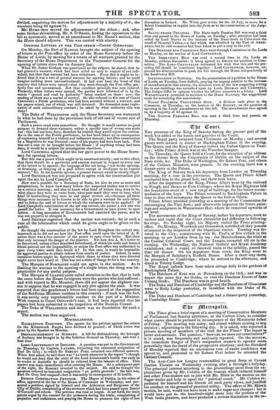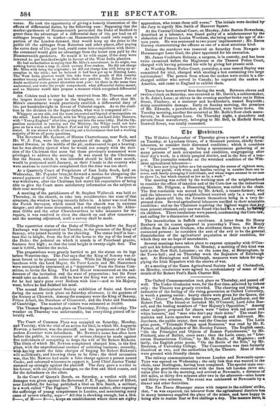Sbe _Metropolis.
The Times gives a brief report of a meeting of Conservative Members of Parliament last Sunday afternoon, at the Carlton Club, to consider what course should be pursued in consequence of the Ministerial defeat of Friday. The meeting was noisy, and closed without coming to any decision ; adjourning to the following day. It is asked, who reported a private meeting of members of the club for the Times? The report is bitter and sarcastic. The question, "how can we meet our constituents?' it is stated, was frequently and anxiously repeated. On the morrow, the immediate danger of Peel's resignation seemed to operate more, powerfully than the dread of the prospective elections ; and the Standard of Monday reported that an unanimous vote of entire confidence was agreed to, and presented to Sir Robert Peel before he attended the Cabinet Council.
The Anti-Corn-law League reassembled in great force at Covent Garden Theatre on Wednesday evening, after a fortnight's holyday. The principal interest attaching to the proceedings arose from the ex- planations given by Mr. Cobden of the reasons which induced himself and other Free-traders not to join with Mr. Miles in the motion on the Sugar-duties and help to upset the "political coach." Mr. Cobden re- pudiated for himself and his friends all such party views, and justified his conduct on the ground of practical utility. The effect of Mr. Miles's motion, he said, would not have been to make sugar any cheaper ; but it would have put 4s. the hundredweight more Into the pockets of the West India planters, and have produced a serious diminution in the re-
venue. He took the opportunity of giving a homely illustration of the effects of differential duties, by the following case Supposing that the market-gardeners of Hammersmith persuaded the Duke of Bedford to grant them the advantage of a differential duty of 10s. per load on all cabbages brought to market—as Hammersmith could only supply a portion of the London demand, they would keep up the price to the public till the cabbages from Battersea and other places, after paying the extra duty of 10s. per load, could come into competition with theirs : the consumer would gain no advantage from the lesser sum paid by the Hammersmith gardeners. So would it be with sugar, if the duty were lowered 4s. per hundredweight in favour of the West India planters. Ile bad no hesitation in saying that Mr. Miles's amendment. in its origin, was nothing better than a trap to catch unwary Free-traders. Ile did not charge Mr. Miles with being the originator ; he did not charge him with being an ac- complice in the trick ; but Ile believed it had been got up in Mincing Lane. The West India planters would fain take from the people of this country another twenty millions to put into their own pockets. Sir Robert Peel no doubt meditated some greater alteration next year: let them in the mean time understand, and make the people comprehend, what differential duties meant, and no Minister would dare propose a measure which recognized differential duties
Mr. Cobden read a letter be had received from Mr. Travers, one of the largest dealers in sugar in the kingdom, to the effect that Mr. Miles's amendment would practically establish a differential duty of 14s. per hundredweight in favour of Colonial sugars. As to the coali- tion in the division on the Sugar-duties, what was it composed of?—
Whiggery on one side, and the most interested and bigoted of monopolists on the other. Lord John Russell, with his Whig party, and Lord John Manners, with "Young England" after him, going out into the same lobby. Ilad the Op- position succeeded in turning out the Ministry, the Whigs could not have gone on for a week, and Sir Robert Peel and his party would have been rein- stated. It was absurd to talk of turning out a Government that had a working majority of 90 on all party questions.
The Reverend Mr. Spencer, of IIinton Charterhouse, near Bath, and Mr. W. J. Fox, were the other speakers of the night. A Chartist named Dwaine, in the middle of the pit, endeavoured to get a hearing; but he was shortly ejected when he would not comply with the deci- sion of the Chairman that none but those previously announced were privileged to address the meeting. It was stated by the Chairman, that the Bazaar, which it was intended should be held next month, would be postponed until January, as their friends in the country who were anxious to contribute complained that the time was too short.
At a Quarterly Court of Proprietors of East India Stock, held on Wednesday, Mr. Poynder brought forward a motion for abrogating the annual payment of 6,0001. to the Temple of Juggernaut. The motion was withdrawn, after the Chairman had stated his expectation of being able to give the Court more satisfactory information on the subject at their next meeting.
A meeting of the parishioners of St. Stephen Walbrook was held on Thursday, in the church, to take into consideration the state of that structure, the window having recently fallen in. A letter was read from the Parish Surveyor, which stated that the church was in extreme danger ; and after some discussion, and a refusal to apply to Mr. Alder- man Gibbs and the other Churchwardens to take measures for the repairs, it was resolved to close the church on and after tomorrow ; and the meeting adjourned, until a survey shall be made.
The equestrian statue of the Duke of Wellington before the Royal Exchange was inaugurated on Tuesday, in the presence of the King of Saxony, who joined heartily in the cheering. The statue itself is four- teen feet in height, from the feet of the horse to the top of the head of the Duke : the pedestal on which it stands is of Peterhead granite, fourteen feet high ; so that the total height is twenty-eight feet. The cost is 9,000/., besides the metal.
The preparations were greatly hurried to get the statue on its legs before Waterloo-day. The Post says that the King of Saxony was al- most forced to be present nolens volens. While his Majesty was taking luncheon with the Lord Mayor, Sir Peter Laurie and Mr. Masterman were unexpectedly announced as a " deputation " from the Statue Com- mittee, to invite the King. The Lord Mayor remonstrated on the sud- denness of the invitation and the want of preparation ; but Sir Peter would take no denial. He said he knew the King was an active man, for he had lately gone over Bedlam with him !—and so his Majesty went, before he had finished his meal.
The second Horticultural Society exhibition of fruits and flowers during the season took place on Saturday afternoon, in the gardens of the Society at Chiswick. Among the company were the King of Saxony, Prince Albert, the Dutchess of Gloucester, and the Duke and Dutchess of Cambridge. The number of N isiters was estimated at 20,000.
The Thames Regatta took place on Thursday, Friday, and today. The weather on Thursday was unfavourable, but every thing passed off to- lerably well.
The Court of Common Pleas was occupied on Saturday, Monday, and Tuesday, with the trial of an action for libel, in which Mr. Augustus Newton, a barrister, was the plaintiff, and the proprietors of the Chel- tenham Examiner were defendants. Mr. Newton's name has often been before the public, in consequence of serious charges he made against five individuals of conspiring to forge the will of Sir Robert Ricketts. The libels of which Mr. Newton complained charged him, in the first place, with the unprofessional conduct of soliciting business; secondly, wilb having made the false charges of forging Sir Robert Ricketts's will maliciously, and knowing them to be false ; the third accusation was, that Mr. Newton had made a false charge against a person named Cooke, and suborned witnesses to support it. Lord Chief Justice Tindal summed up strongly against the plaintiff. The Jury gave a verdict in his favour, with one farthing damages, on the first and third counts, and for the defendants on the other.
In the Court of Queen's Bench, on Saturday, a verdict with 100/. damages was given against the Reverend F. E. Paget, Rector of Elford, near Lichfield, for having published a libel on Mrs. Smith, a milliner, in a work called "The Pageant." The reverend author, after exposing the sufferings of young sempstresses in London, and mentioning many cases of severe cruelty, says—" All this is shocking enough, but a Mrs. S--, of H— S--, keeps an establishment where there are eighty
apprentices, who treats them still worse." The initials were decided by the Jury to signify Mrs. Smith of Hanover Square.
At the Central Criminal Court, on Monday, John Burton Newenhatn, described as a labourer, was found guilty of a misdemeanour by the abduction of Frances Louisa Wortham, she being under the age of six- teen years. He was sentenced to two years' imprisonment ; Mr. Baron Gurney characterizing the offence as one of a most atrocious kind.
Dalmas the murderer was removed on Saturday from Newgate to Horsemonger Lane Gaol, the place appointed for his execution.
Mr. James Cockburn Belaney, a surgeon, is in custody, and has been twice examined before the Magistrate at the Thames Police Court,. charged with having poisoned his wife by giving her prussic acid.
At Worship Street Police Court, yesterday, a man named Bayley was committed for trial, charged with stealing a box containing two large rattlesnakes ! The person from whom the snakes were stolen is a dis- charged soldier who served in Canada; be captured the snakes in America, and came to England to exhibit them.
There have been several fires during the week. Between eleven and twelve o'clock on Saturday, one occurred at Mr. Davis's, a cabinetmaker, in St. John's Lane; at eleven in the evening another broke out in Eldon Street, Finsbury, at a stationer and bookbinder's, named Reynolds ; doing considerable damage. Early on Sunday morning, the premises of Mr. Edwards, a pawnbroker, at Richmond, were burnt down. On Tuesday morning, another fire occurred at Mr. Rolls's floor-cloth manu- factory, in Kennington Lane. On Thursday night, a pianoforte and picture-frame manufactory, belonging to Mr. Bell, in Hatfield Street, Goswell Street, was totally consumed.



























 Previous page
Previous page